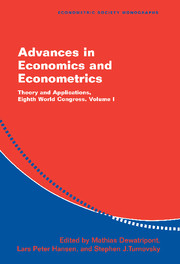Book contents
- Frontmatter
- Contents
- List of Contributors
- Preface
- 1 Auctions and Efficiency
- 2 Why Every Economist Should Learn Some Auction Theory
- 3 Global Games: Theory and Applications
- 4 Testing Contract Theory: A Survey of Some Recent Work
- 5 The Economics of Multidimensional Screening
- A Discussion of the Papers by Pierre-Andre Chiappori and Bernard Salanié and by Jean Charles Rochet and Lars A. Stole
- 6 Theories of Fairness and Reciprocity: Evidence and Economic Applications
- 7 Hyberbolic Discounting and Consumption
- A Discussion of the Papers by Ernest Fehr and Klaus M. Schmidt and by Christopher Harris and David Laibson
- 8 Agglomeration and Market Interaction
- 9 Nonmarket Interactions
- Index
A Discussion of the Papers by Ernest Fehr and Klaus M. Schmidt and by Christopher Harris and David Laibson
Published online by Cambridge University Press: 19 January 2010
- Frontmatter
- Contents
- List of Contributors
- Preface
- 1 Auctions and Efficiency
- 2 Why Every Economist Should Learn Some Auction Theory
- 3 Global Games: Theory and Applications
- 4 Testing Contract Theory: A Survey of Some Recent Work
- 5 The Economics of Multidimensional Screening
- A Discussion of the Papers by Pierre-Andre Chiappori and Bernard Salanié and by Jean Charles Rochet and Lars A. Stole
- 6 Theories of Fairness and Reciprocity: Evidence and Economic Applications
- 7 Hyberbolic Discounting and Consumption
- A Discussion of the Papers by Ernest Fehr and Klaus M. Schmidt and by Christopher Harris and David Laibson
- 8 Agglomeration and Market Interaction
- 9 Nonmarket Interactions
- Index
Summary
It was a pleasure to serve as the discussant for this session. The authors have played a major role in developing the areas under discussion. The papers they produced for this volume are insightful and will help shape the emerging literature. The papers are excellent. I feel fortunate that my task is to comment and not to criticize.
One aspect of this session I found striking was the degree of agreement on how to define and organize a subfield of behavioral economics. In each case, the authors focus on one way in which real-world behavior departs from the standard model of rational self-interested behavior. They begin by mentioning results from a number of experiments showing systematic departures from the standard model. Although Fehr and Schmidt spend a fair amount of time distinguishing between broad classes of fairness models, both sets of authors advocate the use of simple tractable models that reflect essential features of behavior. In the final two paragraphs of the conclusions, both papers argue that behavioral economics models can add much to our understanding of important economic problems.
The similarity in the authors' perspectives makes one class of comments easy – one can look at the nice features of each subfield and suggest that the other might try to do something similar.
- Type
- Chapter
- Information
- Advances in Economics and EconometricsTheory and Applications, Eighth World Congress, pp. 298 - 301Publisher: Cambridge University PressPrint publication year: 2003
- 1
- Cited by



